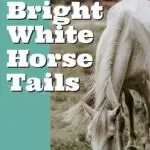Keeping white horse tails white isn’t easy, but in this article you’ll learn proven tips for keeping white horse tails bright and clean.
It’s inevitable if you have a light-colored horse: You’ve dealt with the problem of dingy, yellowed tails. Frustratingly, it’s a fact of life that all white horse tails will yellow as a part of a natural process of hair growth, but there are several grooming tricks you can use to keep your white horse tail bright and white:
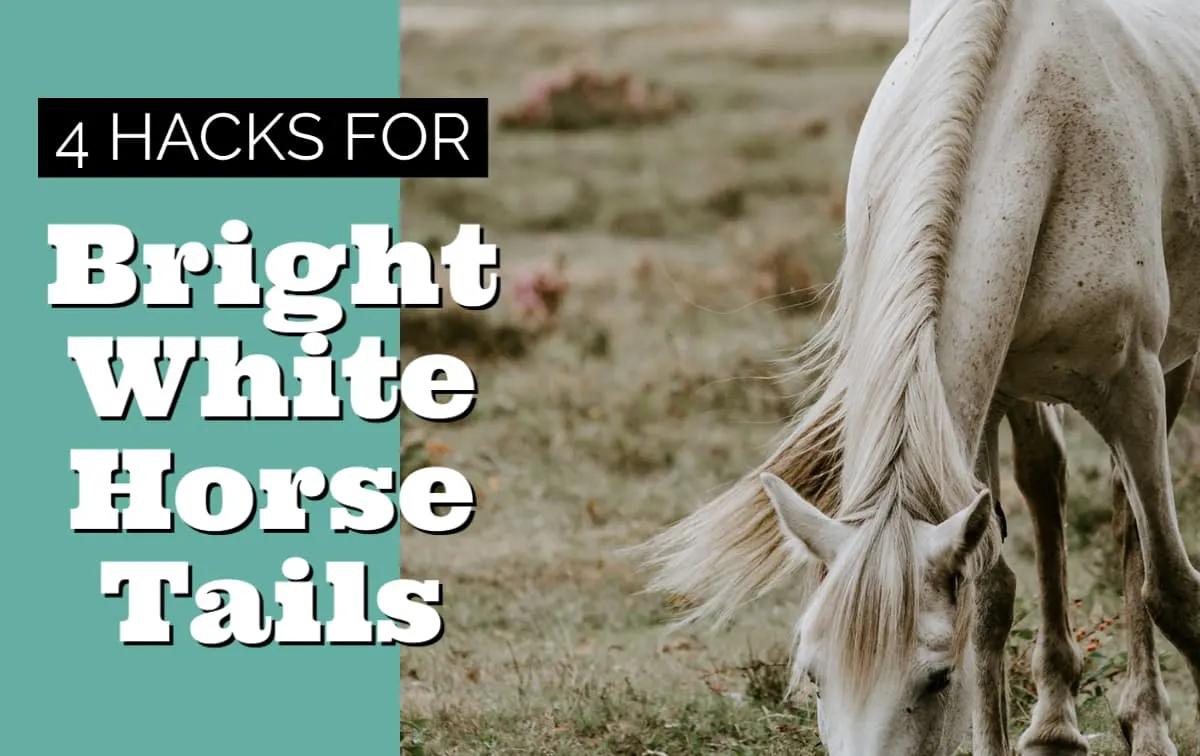
Care for yellowed horse tails comes in two ways:
- 🚫 Prevention. Preventing the tail from picking up natural stains, like those from sleeping in contact with dirty stall bedding, and
- 🟡▶⚪Color Correction. Using faint hair dye you can counteract the natural yellowing. Read on to learn about each of these methods.
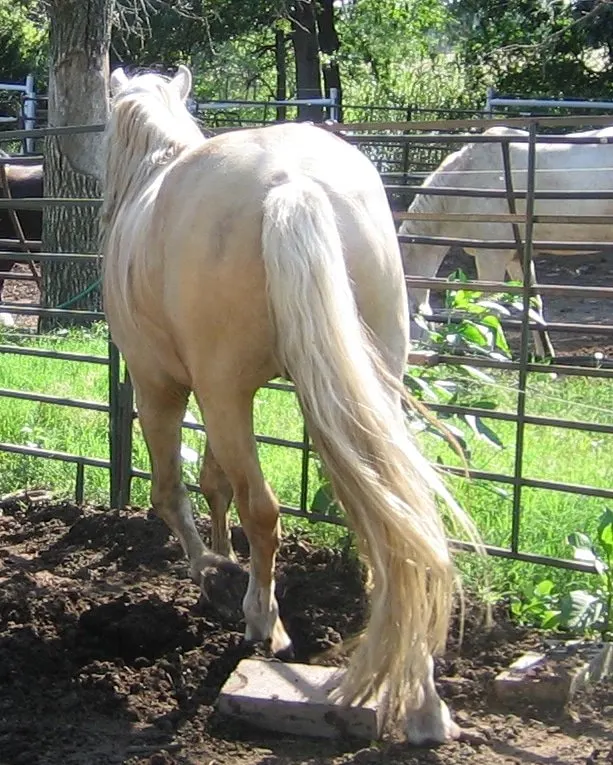
Why do White Tails and Fur Turn Yellow?
White fur turns yellow because of staining and age. The cells of a white tail are “clear” and since hair past the follicle is not living hair, the dead cells have a yellowish tinge.
That may sound like a sign that white tails will turn yellow no matter what you do, but people who show horses have been solving this problem for years!
Here are a few of the horse show world’s best tips, which I picked up while competing in shows with a white mare.
The following section may contain affiliate links. As an Amazon Associate, we earn from qualifying purchases.
Prevention
Keeping the tails of grey horses, paliminos, smoky cream, and pinto horses white starts with preventing stains.
Horse hair – like our own – is made from keratin. When keratine degrades over time (like on a 7-year-old horse tail) it naturally yellows.1 Dark colored horse tails are colored by the presence of a chemical named melanin. If the hair has melanin, the yellowing is not visible. For those of us white horses, this means we have to take extra care.
Protecting white manes and tails from stains and damage (like that created by UV light) can help manes and tails stay white.
By preventing stains, we don’t have to use harsh cleansers on our horses’ manes and tails. In the long run, this may help white tails stay cleaner and brighter.
Color Correction for White Manes and Tails DIY Hair Whitening Shampoo
Good whitening shampoos work by using by a kind of dye that counteracts the yellow.
Laundry Bluing
The most popular ingredient? Believe it or not, it’s a once-common laundry additive called Mrs Stewarts Bluing.
Laundry Bluing doesn’t remove the yellow, but tints the cells slightly blue. The human eye sees this as “brighter” white. There are many whitening shampoos on the market, but they are nearly all a combination of standard shampoo plus a blue dye agent. Save money and make your own with the addition of small amounts of laundry bluing to your shampoo.
Color Depositing Conditioner
In the past few years, I’ve switched from using Laundry Bluing to using a color-depositing conditioner made for humans. It comes in a huge variety of shades (that can be used to tone or highlight darker tails or have some crazy fun with white tails) but the blue color depositing conditioner is perfect for keeping white horse tails brilliant, bright white!
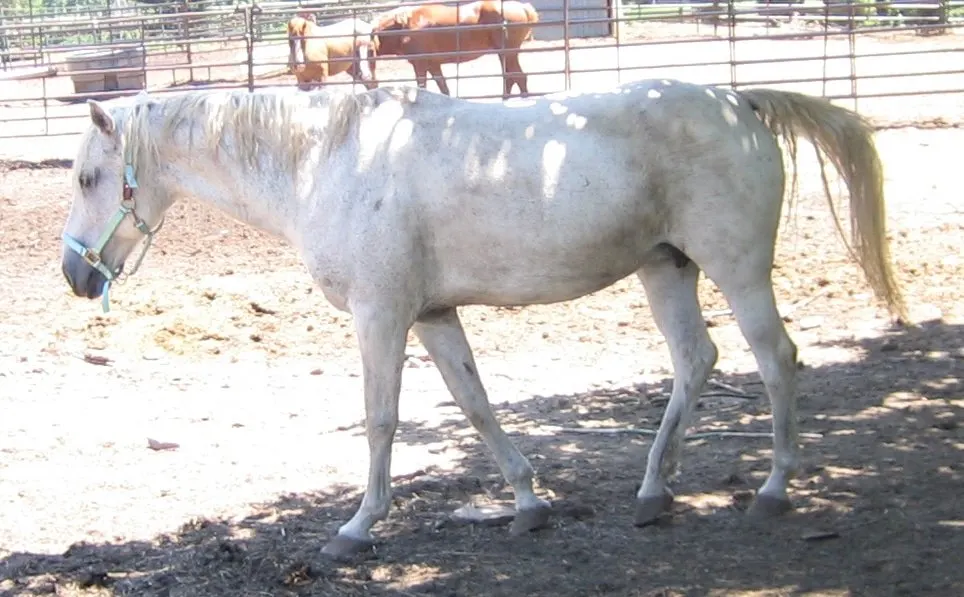
💅🏽🐴 Daily Care for White Horse Tails
In between baths, I try to use a bluing spray, which helps with day-to-day control of yellowing tails. Unfortunately, there’s no bluing spray on the market currently but I make my own by combining 2 teaspoons Mrs. Stewarts Bluing in a bottle of Infusium 23 Leave-in Conditioner. This conditions manes and tails while gently whitening.
Braiding your horse’s tail into a Tail Bag can help prevent staining from environmental factors. Please carefully consider when to braid tails. On our horse boarding farm, we only leave tails braided during the winter months (when tails aren’t needed for fly swatting).
If you use a tail bag, unbraid the tail, wash it with whitening shampoo, and rebraid it every 2 weeks. Consider a hot oil treatment every 6-8 weeks.
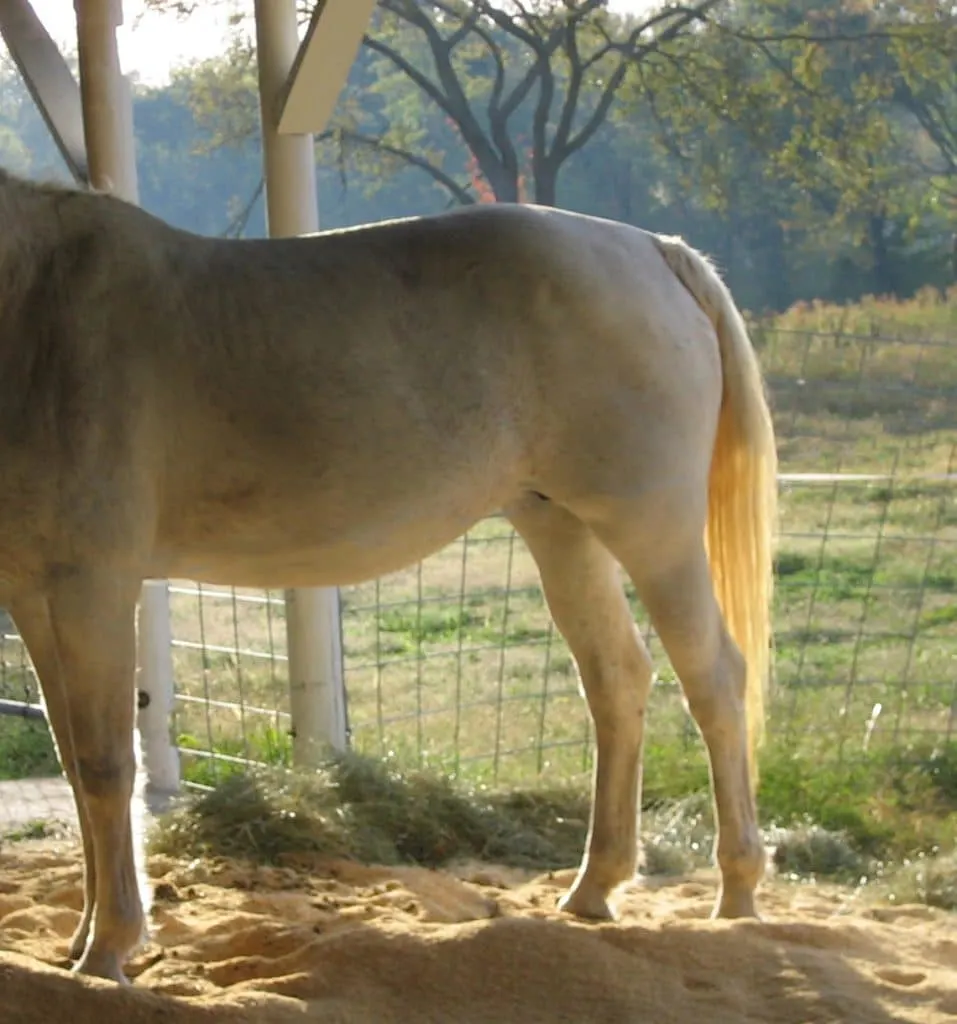
Static Electricity in Horse Tails
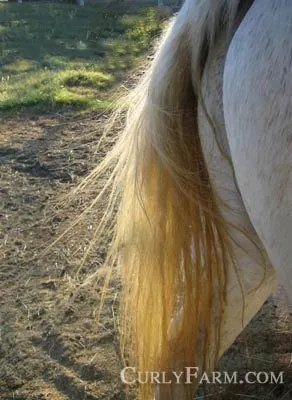
Sometimes static electricity can build up in the manes, tails or forelocks of horses. This happens during especially dry weather, during weather changes, or when the conditions are right for a tornado.
TIP: If static is causing the mane or tail to look disheveled and you desire a neater look, rub the horse’s mane and tail with a dryer sheet (such as bounce, downy, or a store brand).
Usually, this treatment will remove the static electricity from the mane or tail temporarily and allow the hair to tame and lay flat. Static electricity in a horse’s hair, coat, and tails is nothing to be alarmed about, but if your horse tends to be a horse that spooks, you may want to remind yourself to touch something metal to discharge any static buildup in your body before touching your horse.
Read more about keeping white coats clean and bright.
- Oliveira et. al. (2021). Microencapsulated Myrciaria cauliflora Berg. fruit peel extract as a natural pigment for neutralizing shampoo preparation. Scientific Electronic Archives. Issue ID: Sci. Elec. Arch. Vol. 14 (1). January 2021 [↩]

